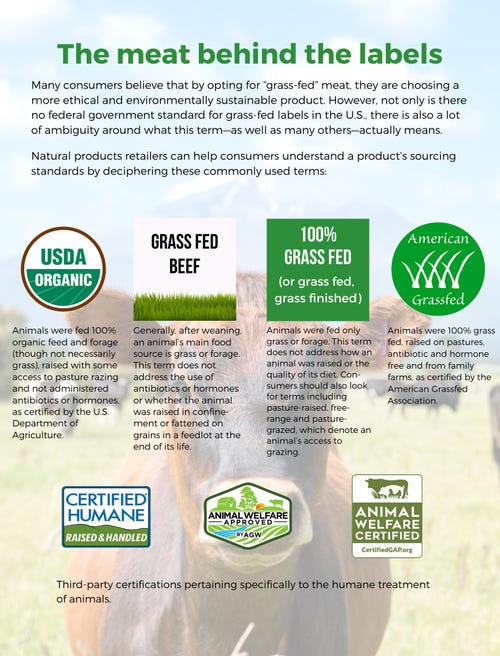.png?width=700&auto=webp&quality=80&disable=upscale)
Meat matters: Consumers want their purchases to make a differenceMeat matters: Consumers want their purchases to make a difference
Today's natural meat producers and retailers partner to promote practices that advance long-term benefits for people and the planet. Consumers need to learn more about the labels, though.

Already have an account?
Two decades ago, Matt Meier sold his food marketing agency and moved his family from the Twin Cities back to the Clearwater, Minnesota, farming community where he was born and raised.
"I knew I wanted to do something to improve the food system," he says. "My research kept leading me back to grass-fed beef and the positive impact that grazing ruminants can have on the soil and product nutrition."
Meier bought some cattle, invested in a local company (of which he eventually took full ownership) and started raising beef. All around him, however, he saw giant operators renting tillable land from small farms and planting an endless rotation of GMO monocrops, degrading one farm after another. Located about a mile from the Mississippi River, this hilly, wetland-dotted area was highly eroded and virtually devoid of organic matter.
Knowing there was a better way to farm, Meier started reaching out to adjacent landowners to try to convince them. Instead of renting the land to corn and soybean farmers, he suggested they all "transform it back into diverse grasses, legumes and forbs; we can replenish and save the eroding, depleted soil."
His strategy worked. Today, Meier's natural meat brand, Thousand Hills, relies on a network of 60 producers. So far, it has helped family farmers convert 600,000 acres to regenerative agriculture—with the goal of reaching 2 million acres by 2025. Many of the early converts were won over by the informal pitches Meier made at industry events for years. But the most convincing arguments were the results: arrested erosion, heathier soil, better water absorption, greater productivity and the return of pollinators and other wildlife.
"I believe this is absolutely vital to saving our food system," Meier says. "We need grazing ruminants to regenerate and rebuild our soil and get nutrition back into our food. We need to not mine our soil for as long as we can, allowing it to regenerate on its own so it can continue to produce for future generations."

Click on download, below, for a printable pdf.
Understanding meat monikers
More and more meat producers who share Meier's passion for improving the food system are embracing regenerative agriculture and other holistic practices. But perhaps the biggest challenge to the continued growth of this movement is consumer unfamiliarity with the term regenerative agriculture. Even better-known meat designations such as grass fed, 100% grass fed, grass finished and USDA Organic are often misunderstood and seen as interchangeable by consumers. They struggle to understand how each pertains to an animal's diet, feed quality (GMO, organic, etc.), living conditions, ability to graze on open pasture and exposure to hormones and antibiotics.
Many producers aim to address these ambiguities by creating their own standards. Examples include Thousand Hills' Lifetime Grazed trademark and Applegate Farms' Applegate Humanely Raised standards, which are third-party verified by Global Animal Partnership and Certified Humane. The American Grassfed Association offers another trusted independent certification, used by Thousand Hills and some 500 other producers of ruminant meat animals, dairy cattle and pastured pork.
Guiding consumers
Labeling uncertainty aside, consumers are increasingly interested in healthier, more humane and more sustainable alternatives to conventional meat. In an August 2019 survey of 1,000 consumers conducted by New Hope Network NEXT Data and Insights, 41% of respondents reported eating grass-fed meat more often during the previous 10 weeks than they had the previous year.
"Consumers want more flavorful, nutrient-rich foods, but perhaps even more importantly, they want their purchases to matter," says Robby Sansom, CEO of Force of Nature Meats. "They want to be able to trust that the companies they support are truly putting purpose alongside profits."
Natural products retailers share the burden of educating shoppers about these products. Especially, Sansom says, since the pandemic's impact on the conventional meat supply has accelerated the quest for transparency. Even though many natural retailers lack traditional meat departments, that hasn't stopped new customers from turning to them to fill the supply-chain gap left by conventional meat—and to respond to increasingly urgent concerns about their own health and that of the planet. This has given natural retailers an interesting opportunity to share the stories behind their products and provide customers with the transparency they value.
For example, Green Acres Market, which has seven locations in Missouri, Kansas and Oklahoma, carries mainly frozen and refrigerated meats. Still, according to president and chief financial officer Shannon Hoffmann, the pandemic has brought in a lot of new customers looking for products they can't find at conventional grocers. Without full meat counters, Hoffmann says it's very important to educate first-time shoppers on the benefits of Green Acres' frozen products. "When new customers see the quality of what we have and then take it home and try it," she says, "they tend to stick with us."
Another big selling point, Hoffmann adds, is that Green Acres focuses on local meats. Working directly with producers to secure its supply chain allowed the company to pivot quickly when the pandemic hit. "We went straight to some of our local producers and partnered with them to harvest whole cows, which they packaged for us to distribute in our stores," she says.
These direct partnerships also make it possible for Green Acres to increase production runs and truck products from store to store as necessary. This strategy is not without pitfalls, though, particularly as some small-scale meat producers have faced processing challenges this year. "One of [our producers] has gotten behind because of overbooked production facilities," Hoffmann says. "So we won't get any Wagyu until January."
Looking to the future
The same kind of resiliency and flexibility demonstrated by Green Acres has helped plenty of other natural retailers survive the recent crisis. These qualities have served many responsible meat producers well, too. In several cases, these businesses have even thrived through the pandemic, marked by increased sales and new customers.
The true test will come as the COVID-19 threat lessens: Will consumers continue to be discriminating about where their meats come from? Will they keep making the effort to support stores and brands that embrace regenerative agriculture and ethical and sustainable sourcing? We can only hope that the work retailers and meat producers put in now to educate and serve shoppers will pay off in dividends down the road.
About the Author
You May Also Like





